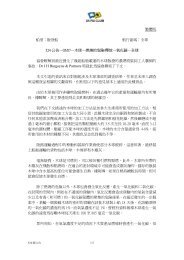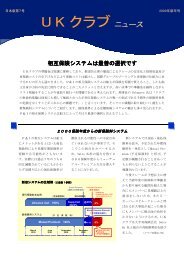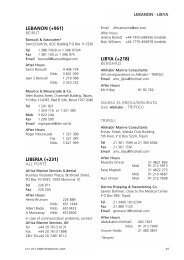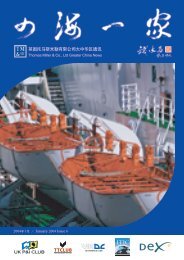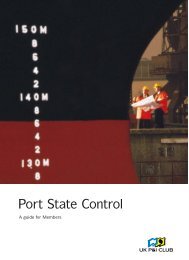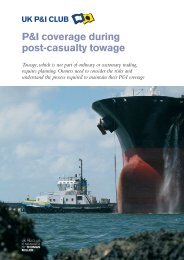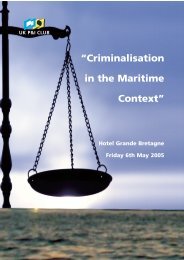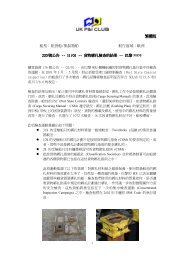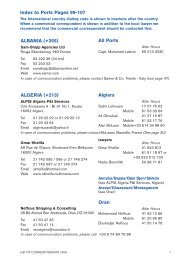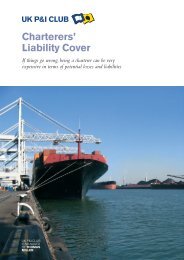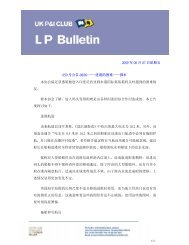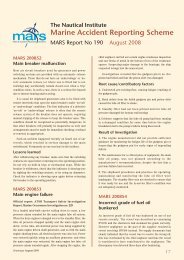Create successful ePaper yourself
Turn your PDF publications into a flip-book with our unique Google optimized e-Paper software.
cargo mattersCarriage ofcoal cargoesSeveral incidents have highlighted furtherpossible problems arising out of the ‘safecarriage of coal cargoes’.It appears that there are still possibleproblems relating to the informationprovided by the shipper and/or hisappointed agent. The IMO Code of SafePractice for Solid Bulk Cargoes clearlystates that the master shall be provided inwriting the characteristics of the cargo andthe recommended safe handlingprocedures for loading and transport.In a recent loading in the Far East, themaster was presented with a shipper'sdeclaration which gave a brief outline ofthe cargo characteristics which includedthe following:“This cargo is not considered liable toemit significant amounts of methane. Thiscargo is not considered liable tospontaneous combustion.”The master had studied the relevantentry in the IMO Code and followed therecommendations of the Code under theheading ‘General requirements for allcoals’.For the first 24 hours of the voyage theholds were surface ventilated to releaseany methane evolved from the cargo. Nomethane was detected in this period andthe hold ventilation was closed. The holdatmospheres mentioned were monitoredfor methane, carbon monoxide and oxygentwice daily in accordance withrecommended procedures. However,within four days of sailing from the loadport, it was noted that the levels of carbonmonoxide in some of the cargo holdsshowed a steady rise. The master reportedthese figures in his daily report andrequested advice.The results of these tests indicated thatthere was a possible spontaneous heatingproblem with the cargo and the masterwas advised to follow therecommendations of the IMO Codedescribed under the heading ‘Specialprecautions self-heating coals’.In particular, he was advised tocompletely close down the cargo spaces,sealing all joints in covers, ventilators, etcwith Ramnek tape. He reported airmovement through the coaming drains andthese were also closed. Within a shortperiod of time, the levels of carbonmonoxide and oxygen began to fall and thisfall continued through the voyage.Discharge was completed with no problems.In respect of coals liable to spontaneousheating, the Code recommends that thehatches should be closed immediately aftercompletion of loading in each cargo space.The atmosphere in the cargo spaces shouldbe monitored and, if the carbon monoxidelevel shows a steady increase, then thecargo spaces should be completely closeddown. The covers could also be additionallysealed with suitable sealing tapes.It should be noted that even well-fittedhatchcovers may be weathertight to rainand seas over the deck. However, withvarious rolling movements of the ship, thecovers may not be ‘airtight’. Leakage of airinto the cargo space will then assistspontaneous heating of the coal.Subsequent heating of the coal will set upthermal movements within the cargospace, hot products of combustion out ofthe space and a fresh supply of oxygen intothe space to assist further oxidation andheating of the coal.It is suggested that ships chartered tocarry coal cargoes should be provided withan adequate supply of sealing tape tomaintain effective sealing of the cargospaces.<strong>Members</strong> should note that this incidenthighlights the need to closely follow therecommendations of the IMO Code relatedto the carriage of coal ■...............................................................................................................................................................................................................................................................................................<strong>UK</strong>RAINEDischarge ofbagged riceThere have been several recent caseswhere ships have faced difficultiesdisharging cargoes of bagged rice inUkrainian ports due to the cargo beingallegedly of an unsound condition.The Ukraininan ports’ State SanitoryAuthority (SSA) boards ships immediatelyon arrival to inspect the apparentcondition of the cargo. If mould is found tobe present, even if only on the cargopacking, the SSA will prohibit discharge ofall cargo from the holds where the mouldybags were found. The position held by theSSA in these circumstances is a tough oneand it is difficult to negotiate with themand the cargo receivers. The cargoreceivers will reject the cargo claiming itdoes not correspond to the clean bills oflading on the grounds of the SSA’s findings.Occasionally, mould may be apparent onlyon the outside of the bags, but in manycases the rice adjoining the material of thebag is also affected. It should be stressedthat it makes no difference to the SSAwhere the mould was found, or thepossibility of segregating sound from thedamaged bags, as further discharging ofsound bags is often forbidden.This problem concerns mainly shipsarriving from Chinese load ports, wherethe cargo is occasionally packed in singlewoven polypropylene bags (not doublebags) and is stored (prior to loading) instacks in an open area covered only bytarpaulin. As a consequence, some bagsbecome wetted / collect moisture prior toand during loading operations. During along passage from China to the Black Sea,stowage of the cargo inside the holds –ie. without sufficient vertical andhorizontal channel ventilation – will alsoadd to the development of mould.<strong>Members</strong> should be aware of theextreme action being taken by theUkrainian authorities and be particularlycareful when loading this type of cargo,especially from Chinese ports at this time ■4



